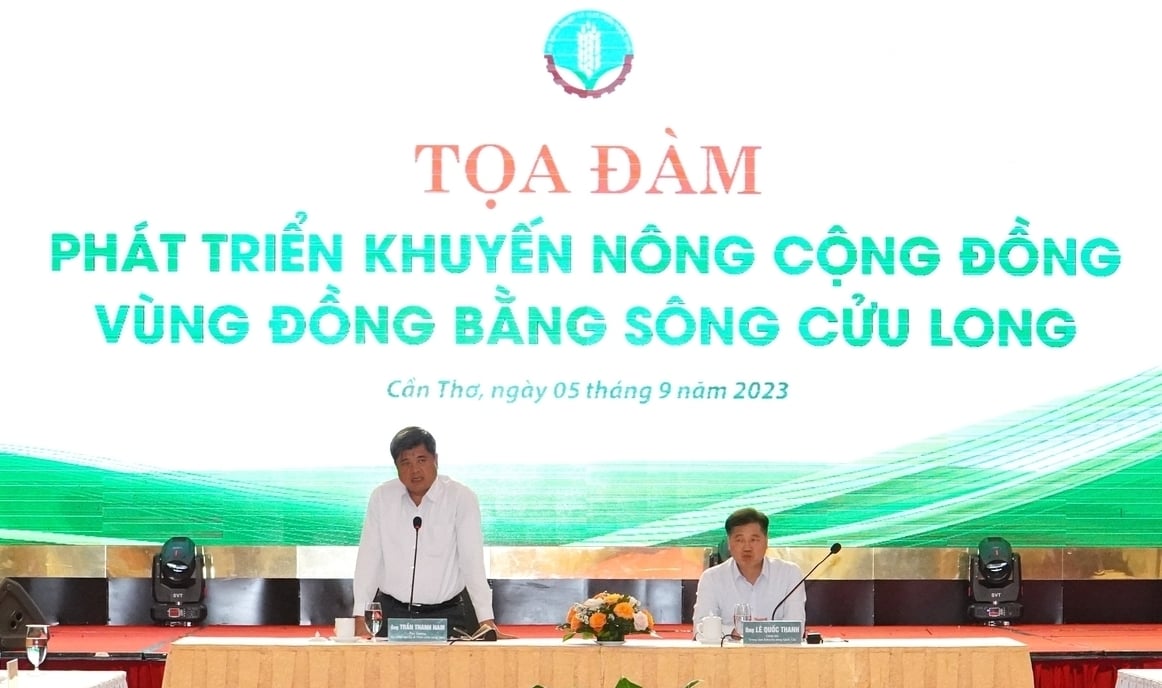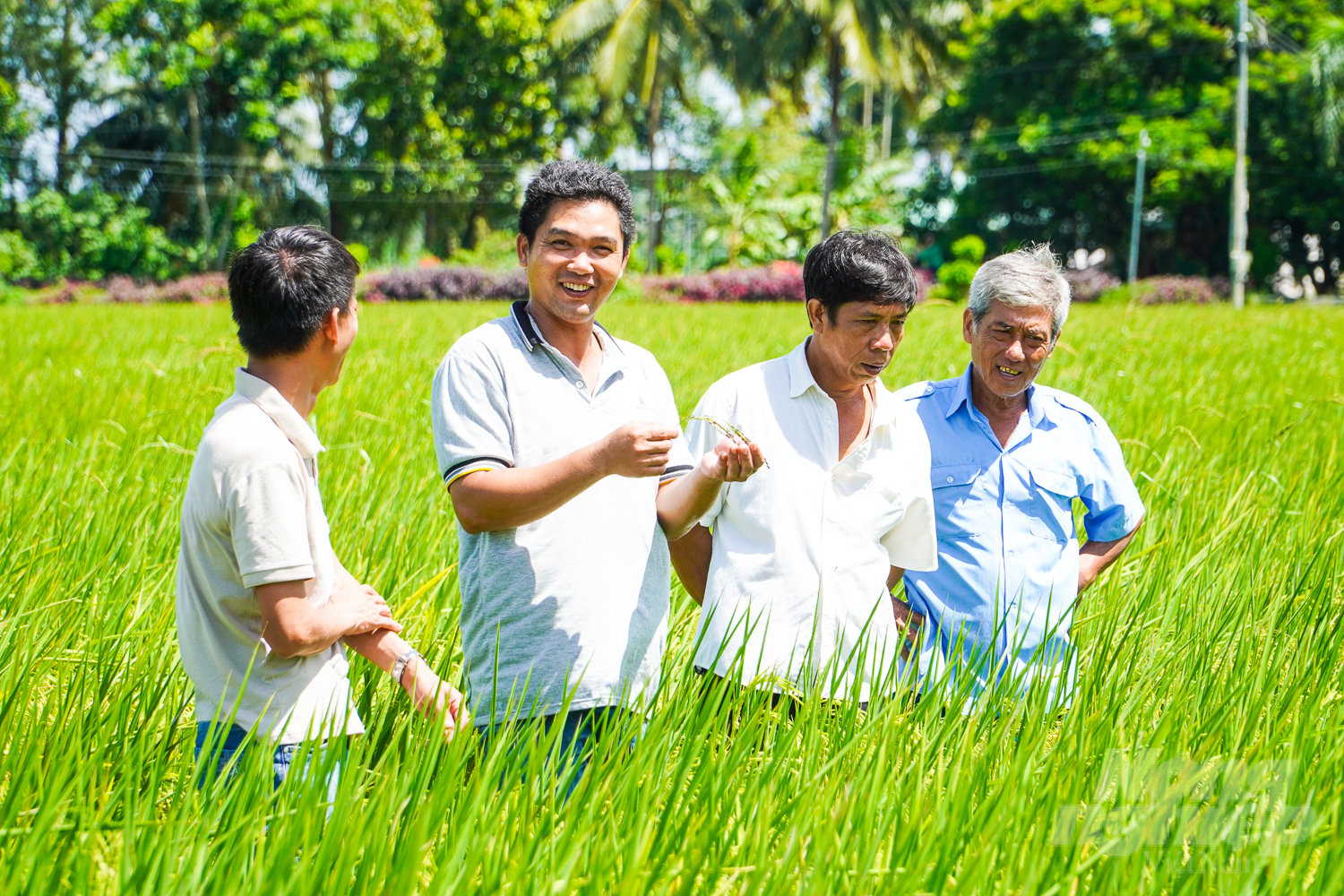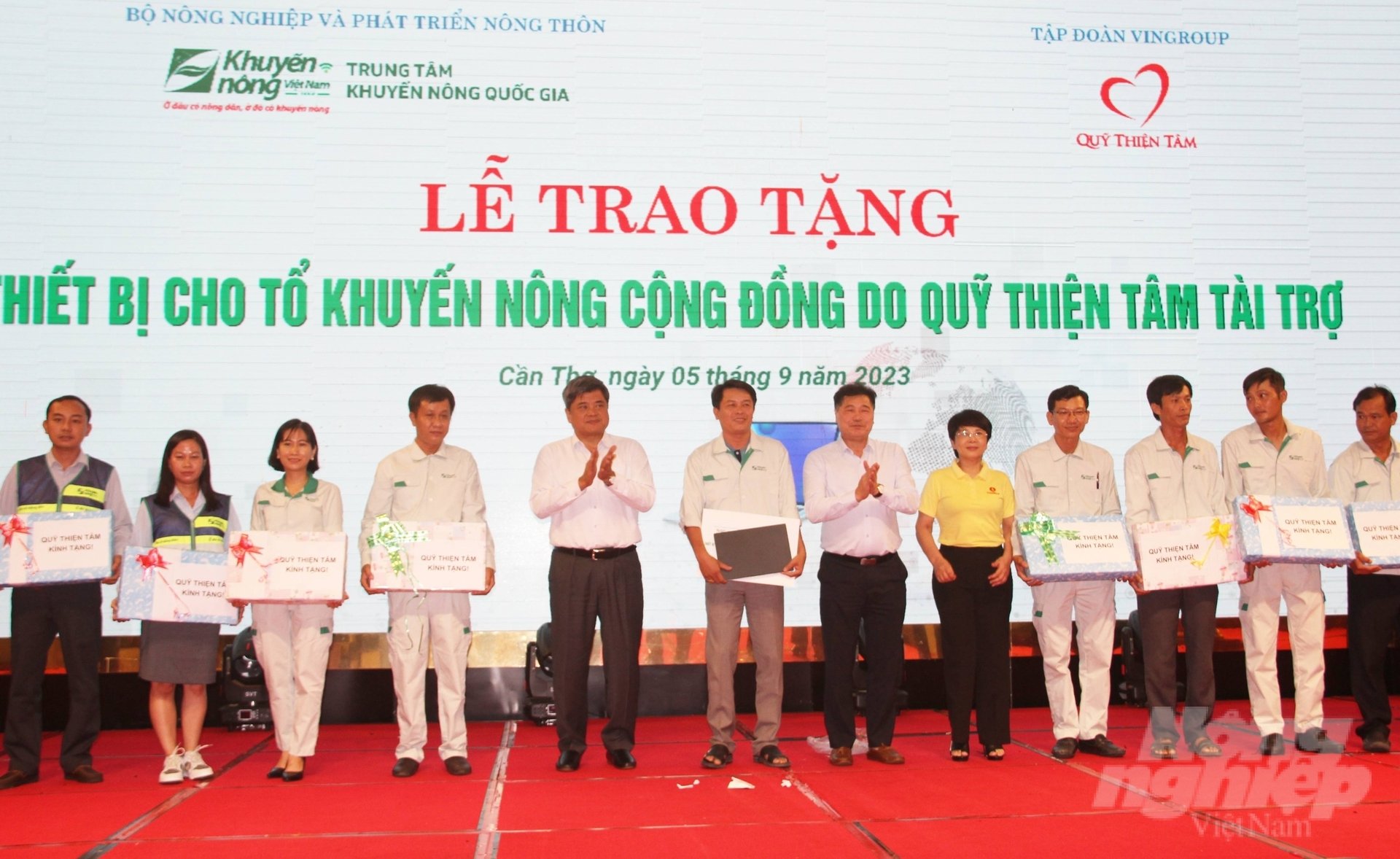June 4, 2025 | 20:23 GMT +7
June 4, 2025 | 20:23 GMT +7
Hotline: 0913.378.918
June 4, 2025 | 20:23 GMT +7
Hotline: 0913.378.918

The discussion on Community Agricultural Extension Development in the Mekong Delta is an activity to celebrate the 30th anniversary of the establishment of the National Agricultural Extension Center. Photo: Kim Anh.
The Ministry of Agriculture and Rural Development issued Decision No. 1094/QD-BNN-KN on March 25, 2022 to approve the Project on improving the efficiency of agricultural extension activities by enhancing the community agricultural extension group model. During the implementation process, the Project has piloted the establishment of 26 community agricultural extension groups across 13 provinces and cities in 5 raw material areas: fruit trees in the Northern mountainous region; certified timber forests in the Central Coast; coffee trees in the Central Highlands; rice in the Long Xuyen Quadrangle and fruit trees in Dong Thap Muoi.
Five provinces and cities in the Mekong Delta region are involved in the project, including Kien Giang, An Giang, Dong Thap, Tien Giang, and Long An. Initially, there were 10 community agricultural extension groups in the region, which has since expanded to 356 groups in total.
After over one year of pilot implementation, the project has expanded to 30 additional provinces and cities, establishing 3,500 community agricultural extension groups. Most notably, several provinces and cities in the Mekong Delta region which are outside the pilot area of the Project have established their own community agricultural extension groups that operate effectively in most new rural communes.

To date, there are 3,500 community agricultural extension groups across the country. Photo: Kim Anh.
According to Mr. Le Quoc Thanh, Director of the National Agricultural Extension Center, the results of the project have exceeded expectations. Although the project is still in the pilot stage, participating provinces and cities have continuously replicated community agricultural extension groups with increasingly diversified and effective activities. The most important factor in this project is the connection with local communities as well as their participation in agricultural extension activities. Furthermore, several community agricultural extension groups have established a connection with businesses, built and developed production cooperatives with a focus on building sustainable raw material areas.
The National Agricultural Extension Center aims to draw experience from the results of the pilot stage in order to adjust and establish the basic principles for community agricultural extension activities.
Mr. Thanh emphasized that the project does not organize community agricultural extension groups based on a singular model, but basic principles. As a result, the project will encourage the community, including businesses, socio-political organizations, and experienced farmers to participate in agricultural extension activities.
According to Mr. Le Quoc Dien, Deputy Director of Dong Thap province's Department of Agriculture and Rural Development, the provinc has established 89 community extension groups by the end of August 2023. Two of these groups are managed by the Ministry of Agriculture and Rural Development. Additionally, the province has trained 480 professional farmers from community extension groups to operate more sustainably and effectively.
Despite being outside of the pilot project's scope, Ben Tre has established 90 community extension groups with 720 members to date. Moreover, the province's agricultural sector has built 10 community agricultural extension groups to serve as a foundation for replication.
The Center for Agricultural Extension and Agricultural Service Consulting in Ben Tre province also actively cooperates with local businesses to create value chain linkages. In addition, the province enables its community agricultural extension groups to participate in agricultural models with capital in the new rural construction program in order to generate additional funds, increase income and raise the capacity of its members.

According to Deputy Minister of Agriculture and Rural Development Tran Thanh Nam, community agricultural extension groups should be encouraged to diversify their agricultural services. Photo: Kim Anh.
Deputy Minister of Agriculture and Rural Development Tran Thanh Nam commended Ben Tre's approach as one of the necessary solutions to promote the development of community agricultural extension groups with a focus on proactivity, responsibility, transparency, and democracy. Additionally, the model must be supervised and supported by the community and state management agencies.
Agricultural extension officers must be trained on the organization of cooperatives and linkages with businesses; directly providing instructions to farmers; sharing a living space with farmers. On the other hand, it is necessary to master market information to provide farmers with information regarding production subject, suggested price, target market, and potential output.
According to Deputy Minister of Agriculture and Rural Development Tran Thanh Nam, community agricultural extension groups should be encouraged to diversify their agricultural services. This approach will not only support farmers but also increase income for the agricultural extension groups.
The Mekong Delta is a dynamic agricultural production area with diverse and unlimited agricultural extension activities. Deputy Minister Tran Thanh Nam proposed local Departments of Agriculture and Rural Development and businesses to coordinate and establish effective community agricultural extension groups that can satisfy production needs.

Deputy Minister Tran Thanh Nam (fourth from left) handing over equipment to the community agricultural extension group sponsored by Thien Tam Fund (Vingroup). Photo: Kim Anh.
“Establishing a community agricultural extension group is extremely important. We cannot rush and build a series of community agricultural extension groups without the funding for them to operate. We must be thorough and methodical in their establishment. Otherwise they would disbanded shortly after establishment, and it will be extremely difficult to re-establish", Deputy Minister Tran Thanh Nam noted.
Deputy Minister Tran Thanh Nam proposed to strengthen and provide regular training courses in order to improve the qualifications of established groups. In addition, stakeholders need to create close vertical - horizontal links that involve state management agencies, scientific research facilities, training facilities, businesses and agricultural extension teams in the creation of professional farmers.
According to Mr. Vo Xuan Tan, Director of Hau Giang province's Center for Agricultural Extension and Agricultural Services, following the establishment of a community agricultural extension groups led by the Ministry of Agriculture and Rural Development, Hau Giang province's Department of Agriculture and Rural Development has assigned theC enter for Agricultural Extension and Agricultural Services as the focal point for community agricultural extension groups.
Community agricultural extension groups have developed plans and operating regulations. Additionally, they have established agricultural technical groups including agricultural, plant protection, animal husbandry, and veterinary officials who receive salaries and operating funds from the state budget.
Translated by Nguyen Hai Long

(VAN) VAAS and numerous Vietnamese enterprises have signed cooperation agreements with Japanese partners to promote agricultural technology and trade connectivity.
/2025/05/29/5625-12-214801_567.jpg)
(VAN) Provincial mergers in the Mekong Delta promise to streamline administration, expand inter-provincial raw material areas, and foster close linkages in agricultural value chains, benefiting both businesses and cooperatives.

(VAN) Merging Mekong Delta provinces contributes to the expansion of agricultural raw material areas, addressing previous constraints caused by provincial boundaries. Additionally, this expansion will reduce costs and strengthen linkages between businesses, cooperatives, and farmers.
/2025/05/29/1043-2-153730_145.jpg)
(VAN) The Government's policy to merge provincial-level administrative units opens up major opportunities for the Mekong Delta region to reshape its agricultural development strategy toward large-scale production, effective regional linkages, and sustainability.

(VAN) The mutual export of agrifood products between the European Union (EU) and the United Kingdom (UK) must occur again without certification, border controls or other red tape. This was agreed at the UK-EU summit.
/2025/05/22/5121-2-173645_677.jpg)
(VAN) NBSAP Tracker identifies strengths and areas for improvement in the National Biodiversity Strategy, based on each region’s priorities and capacities.

(VAN) The draft amendment to the Circular on rice export trading stipulates a periodic reporting regime for rice exporting enterprises.